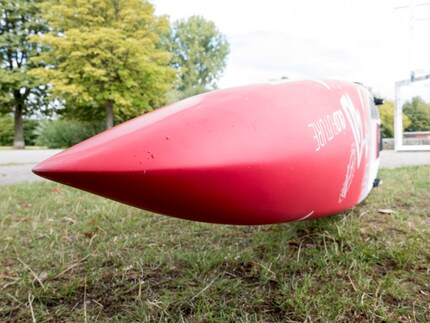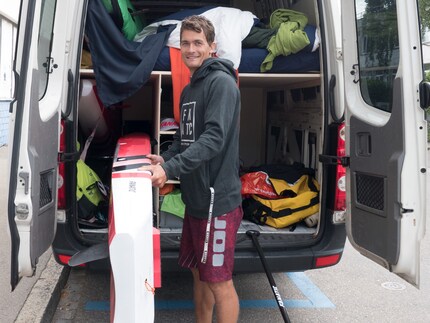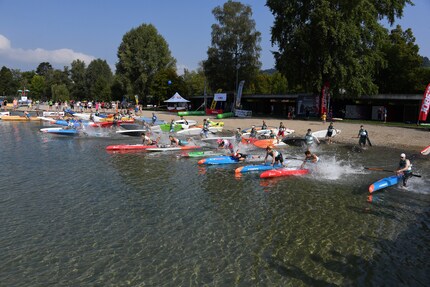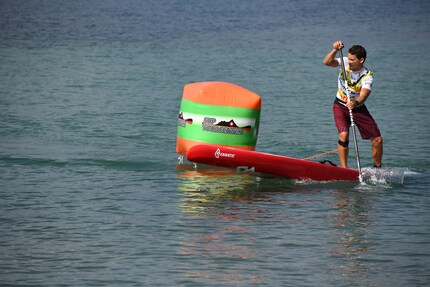
"The sea shows you who's the boss"
Alain Luck from Zurich is one of the best Swiss stand-up paddlers. In this interview, he tells me about the competitive sport of SUP, new developments and moments when he feels very small even on a big board.
He stands relaxed on land. Alain Luck has already completed his training session when we meet for the interview in Zurich-Wollishofen in the morning. His red board, which looks a bit like a boat, is lying on the ground and his self-built bus, which he uses to travel to races across Europe, is parked by the road. Surfer style. Except that he stands on his board with a paddle. Stand-up paddling is still relatively unknown as a competitive sport. I know very little about the scene. We sit down on the shore and Alain broadens my sporting horizons.


You went from rowing to windsurfing to stand-up paddling. Now you have a board without a sail and a paddle without a boat. What fascinated you so much that you stuck with it?
"After rowing, I wanted to do something where it wasn't just two kilometres straight ahead on flat water. Windsurfing was incredibly fun for me. But as a competitive sport, it wasn't for me because I live in Zurich. There's not so much wind there. When stand-up paddling came along, it was a logical change. Suddenly, all the windsurfers had a board as an activity in calm conditions. After a while, I realised: I just paddle and don't surf anymore."
You've been at the top for a few years now, you were Swiss champion and won the SUP Tour Switzerland. How has the sport developed in that time?
"We used to be only about ten to fifteen people, but they were all relatively fast. There weren't that many recreational athletes who just took part. In the end, we were all amateurs, but now there are a lot more people who take part in the races even without much training. That's a nice development."
That's how I know stand-up paddling. As a recreational sport, with inflatable boards and at a leisurely pace. What's it like in competitive sports and what disciplines are there?
"In long-distance races, the distance is usually between 8 and 20 kilometres, which takes me about one to two hours. Then there are shorter races, so-called 'technical races' with a lot more buoys and sometimes a short run on the beach. You start on land and run into the water with your board, go round a few buoys and come back to the running course before the next lap. It's also exciting for the spectators."


Which discipline is more important to you?
"The long distance is a bit like the supreme discipline. The race counts the most, which is why we mainly train for it. But I also really like the short-distance races because they are technically demanding. It's more fun than paddling straight ahead for an hour. When there are five of you paddling towards a buoy and you have to see how you can get round first..."
...or not.
"Falls do happen and it can take fifteen seconds to get back on the board. But it's not impossible to catch up again."
Is there such a thing as right of way rules or is it board to board?"There is already board-to-board fighting. You're allowed to push your opponent off a bit. The rule is simply that you're not allowed to actively obstruct, push or shove anyone away with the paddle."What role does the equipment play? You have three different boards in your bus."There are flat water boards that are more pointed and slim at the front. They almost resemble a racing kayak and are made for travelling straight ahead as quickly as possible in calm conditions. They work reasonably well up to knee-high waves, but in higher swells and on the sea they are no longer paddleable. But there are other types that are made more like a surfboard." [[image:16210448 "Three boards for all occasions: Alain with his equipment, you can see the flat water board on the left."]]You've just finished eighth in the 11 City Tour in the Netherlands. A stage race covering 220 kilometres in just five days was also something new for you. What did you get out of it apart from sore muscles and a good position?"Fortunately, I was over the sore muscles by the third day. I learnt a lot about my diet. I didn't eat enough on the first day, especially after the race, and I had to pay dearly for that on the next stage. After that, I had three meals each evening to recharge my batteries. In the beginning, I also tried to eat mainly liquids while paddling. Then I realised that I also needed a certain amount of solid food. Everything got better towards the end of the week, which was exciting to see. One advantage I'll take home with me is certainly mental: if you can paddle like this for five days, then any 'normal' race is probably no longer a problem." You don't just do 'normal' races, you've also travelled in all kinds of conditions. What was your most extreme experience?"Being out at sea makes you very humble. As long as the water is flat, you have the feeling that it's easy. And then you're out there and the sea shows you who's boss. Learning to downwind was hard."Downwinding means...?"You're not on the beach surfing a wave that breaks, you're out on the water paddling with the wind and the wave. So you try to ride waves that don't really break. I also spend a lot of time travelling in Brittany in winter and the waves are relatively big there. The coasts are rocky and the waves crash back into the sea. You then swim quite a lot and it feels like you come home a bit smaller than when you set off." [[video:93361]]## About the personAlain was born on 2 February 1988 and doesn't just paddle across Swiss lakes at racing speed. As an instructor and sports director at Supkultur, he passes on his expertise and passion. "On the side", he is working towards a master's degree in history and Islamic studies. His sporting goals are increasingly taking him further afield: in winter, he will compete in the World Championships in Hainan, China - if his board also arrives there in one piece. Instagram: @alainluck // Facebook: @alainlucksup // Blog: alainluck.ch
Simple writer and dad of two who likes to be on the move, wading through everyday family life. Juggling several balls, I'll occasionally drop one. It could be a ball, or a remark. Or both.
Interesting facts about products, behind-the-scenes looks at manufacturers and deep-dives on interesting people.
Show all